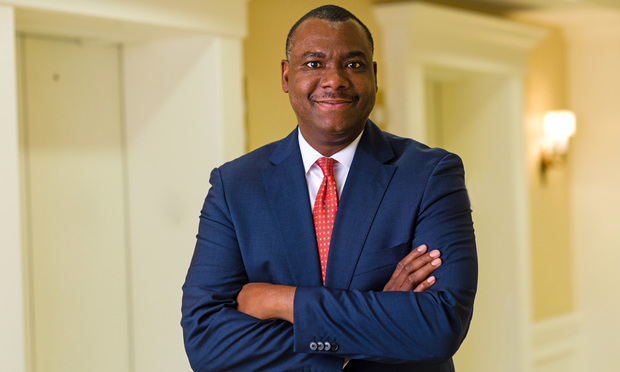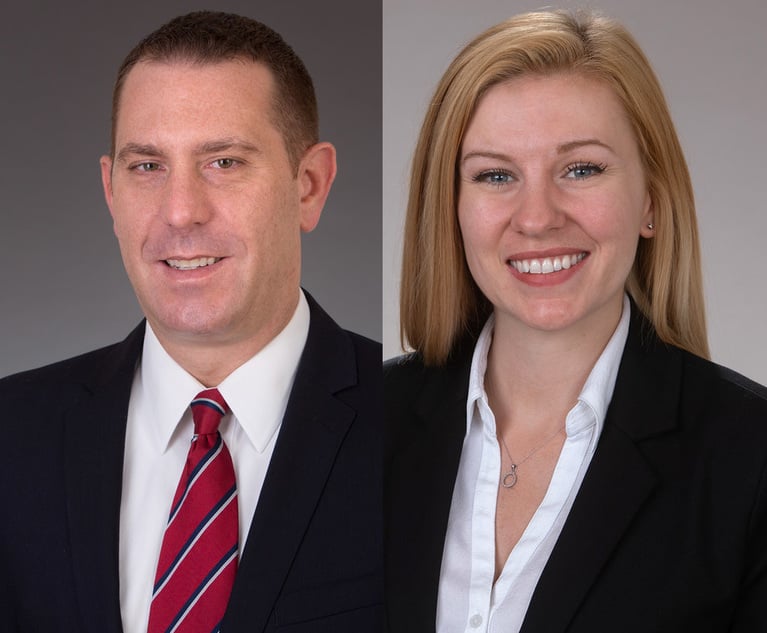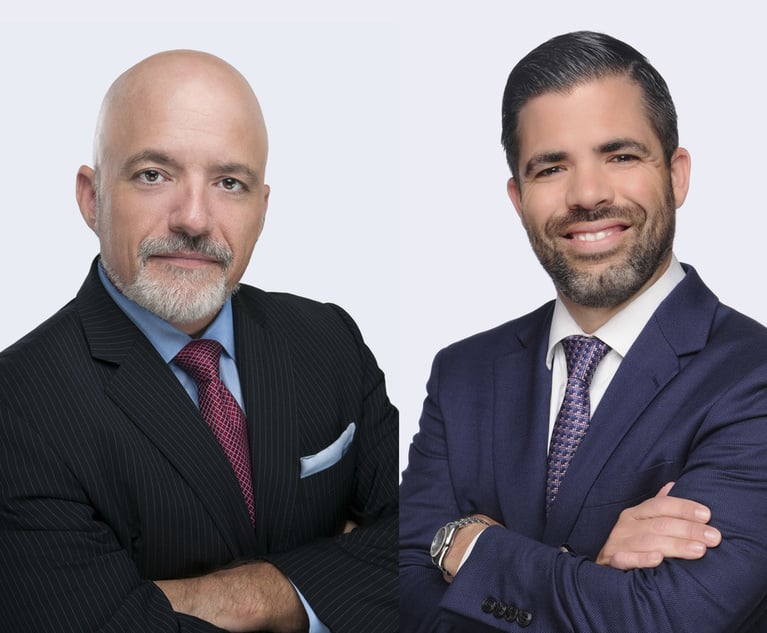Florida Looks to Integrate Blockchain Into Effective, Efficient Government Uses
Blockchain is defined by IBM as, "a shared ledger for recording the history of transactions, that cannot be altered." It has no central authority and is peer-to-peer combined with a system of "smart contracts" and other assistive technologies.
April 21, 2020 at 09:42 AM
4 minute read
 Ronald A. Brisé practice group leader of the Government affairs law & lobbying practice with Gunster.
Ronald A. Brisé practice group leader of the Government affairs law & lobbying practice with Gunster.
Blockchain is becoming increasingly popular among industries worldwide and has the ability to revolutionize the way the world conducts business digitally. Blockchain is defined by IBM as, "a shared ledger for recording the history of transactions, that cannot be altered." It has no central authority and is peer-to-peer combined with a system of "smart contracts" and other assistive technologies. Blockchain is decentralized, meaning it is stored on multiple computers, enabling it to be immensely secure with no way of being altered unless altering all other blocks. All parties must give a consensus before a new transaction is added to the network. Blockchain is utilized worldwide by a variety of industries including finance, health care, law, real estate, government and education.
To fully understand the scope of blockchain it is important to dissect the word. The "block" refers to the digital information stored on the "chain," public or private networks. The blocks, where digital information is stored is comprised of three different functions:
- Storage of information about the transaction, such as the amount, and the date and time
- Information about who is making the transaction
- Each block has an identifying "hash" created by algorithms to immutably chain the data
The state of Florida has the opportunity to integrate blockchain technology into effective and efficient government uses. In 2019, 45 blockchain bills were passed and many state governments are already exploring how to transition blockchain into government functions such as registrations, benefits, voting and elections, identity management, asset tracking, payments, health care and many more projects.
Blockchain has the potential to prevent fraud, overpayments and overpayments for state benefit payments by creating an all-inclusive ledger of benefit recipient information across multiple states. This use of blockchain technology will help states determine if a person is already receiving benefits by accessing benefit information when determining eligibility. This will help prevent fraud and increase efficiency by allowing multiple states and agencies to match eligibility information. Overall this will benefit states by helping decrease time spent matching individuals and decrease the amount lost to dual-enrollment and fraud.
Additionally, blockchain has multiple uses for the health care industry. It often has issues with streamlining data due to the high volume and high sensitivity of information. Blockchain technology would simplify these issues by making it easier to access information within different nodes of the industry, including the supply chain. Supply chain issues are a common topic in the face of the COVID-19 pandemic. With blockchain, industry suppliers would control nodes and each time the supplier entered transactions, they would be recorded on the blockchain, simplifying the collection and transfer of data and allow consumers to easily maintain and track transactions. Physicians often face credentialing obstacles multiple times a year, taking away from patient care, costing billions annually. Blockchain would allow health care providers to easily access and enter credentials to avoid redundancies in submitting credentials.
In 2019 the Blockchain Task Force was established within the Florida Department of Financial Services to explore and develop a master plan for the expansion of the blockchain industry in the state. The Task Force is responsible for recommending policies and state investments to make Florida a trailblazer in blockchain technology. The task force studies how state, county, and municipal governments can benefit from a transition to blockchain-based systems for recordkeeping, data security, financial transactions and service delivery.
Florida's task force will continue to lead through 2021 in an effort to continue to advance the integration of blockchain in state buisness. The natural progression of blockchain technology will continue to lead the state's transition to innovations in FinTech, or financial technology. FinTech will compete with traditional financial proceedings by increasing efficiency and security. The task force will continue to monitor and suggest legislation that will support the advancement of this new technology and look forward toward new strategy and usage.
There are many practical applications for blockchain that are already being explored by businesses worldwide. This technology will make business and government proceedings more secure, efficient and accurate.
Ronald Brisé serves as chair of Gunster's government affairs and lobbying practice. He is a former state representative and member of the state Public Service Commission.
This content has been archived. It is available through our partners, LexisNexis® and Bloomberg Law.
To view this content, please continue to their sites.
Not a Lexis Subscriber?
Subscribe Now
Not a Bloomberg Law Subscriber?
Subscribe Now
NOT FOR REPRINT
© 2025 ALM Global, LLC, All Rights Reserved. Request academic re-use from www.copyright.com. All other uses, submit a request to [email protected]. For more information visit Asset & Logo Licensing.
You Might Like
View All
Trending Issues in Florida Construction Law That Attorneys Need to Be Aware Of
6 minute read


Trending Stories
Who Got The Work
J. Brugh Lower of Gibbons has entered an appearance for industrial equipment supplier Devco Corporation in a pending trademark infringement lawsuit. The suit, accusing the defendant of selling knock-off Graco products, was filed Dec. 18 in New Jersey District Court by Rivkin Radler on behalf of Graco Inc. and Graco Minnesota. The case, assigned to U.S. District Judge Zahid N. Quraishi, is 3:24-cv-11294, Graco Inc. et al v. Devco Corporation.
Who Got The Work
Rebecca Maller-Stein and Kent A. Yalowitz of Arnold & Porter Kaye Scholer have entered their appearances for Hanaco Venture Capital and its executives, Lior Prosor and David Frankel, in a pending securities lawsuit. The action, filed on Dec. 24 in New York Southern District Court by Zell, Aron & Co. on behalf of Goldeneye Advisors, accuses the defendants of negligently and fraudulently managing the plaintiff's $1 million investment. The case, assigned to U.S. District Judge Vernon S. Broderick, is 1:24-cv-09918, Goldeneye Advisors, LLC v. Hanaco Venture Capital, Ltd. et al.
Who Got The Work
Attorneys from A&O Shearman has stepped in as defense counsel for Toronto-Dominion Bank and other defendants in a pending securities class action. The suit, filed Dec. 11 in New York Southern District Court by Bleichmar Fonti & Auld, accuses the defendants of concealing the bank's 'pervasive' deficiencies in regards to its compliance with the Bank Secrecy Act and the quality of its anti-money laundering controls. The case, assigned to U.S. District Judge Arun Subramanian, is 1:24-cv-09445, Gonzalez v. The Toronto-Dominion Bank et al.
Who Got The Work
Crown Castle International, a Pennsylvania company providing shared communications infrastructure, has turned to Luke D. Wolf of Gordon Rees Scully Mansukhani to fend off a pending breach-of-contract lawsuit. The court action, filed Nov. 25 in Michigan Eastern District Court by Hooper Hathaway PC on behalf of The Town Residences LLC, accuses Crown Castle of failing to transfer approximately $30,000 in utility payments from T-Mobile in breach of a roof-top lease and assignment agreement. The case, assigned to U.S. District Judge Susan K. Declercq, is 2:24-cv-13131, The Town Residences LLC v. T-Mobile US, Inc. et al.
Who Got The Work
Wilfred P. Coronato and Daniel M. Schwartz of McCarter & English have stepped in as defense counsel to Electrolux Home Products Inc. in a pending product liability lawsuit. The court action, filed Nov. 26 in New York Eastern District Court by Poulos Lopiccolo PC and Nagel Rice LLP on behalf of David Stern, alleges that the defendant's refrigerators’ drawers and shelving repeatedly break and fall apart within months after purchase. The case, assigned to U.S. District Judge Joan M. Azrack, is 2:24-cv-08204, Stern v. Electrolux Home Products, Inc.
Featured Firms
Law Offices of Gary Martin Hays & Associates, P.C.
(470) 294-1674
Law Offices of Mark E. Salomone
(857) 444-6468
Smith & Hassler
(713) 739-1250






